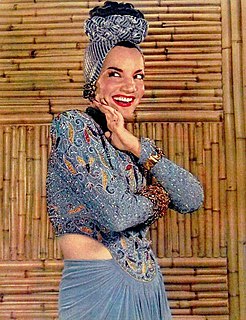Roma or ROMA may refer to:

Carmen Miranda, was a Portuguese-born Brazilian samba singer, dancer, Broadway actress and film star who was active from the late 1920s onwards. Nicknamed "The Brazilian Bombshell", Miranda was known for her signature fruit hat outfit that she wore in her American films. As a young woman, she designed hats in a boutique before making her first recordings with composer Josué de Barros in 1929. Miranda's 1930 recording of "Taí ", written by Joubert de Carvalho, catapulted her to stardom in Brazil as the foremost interpreter of samba.

Brazil is a 1985 dystopian black comedy film directed by Terry Gilliam and written by Gilliam, Charles McKeown, and Tom Stoppard. The film stars Jonathan Pryce and features Robert De Niro, Kim Greist, Michael Palin, Katherine Helmond, Bob Hoskins, and Ian Holm.

Saludos Amigos is a 1942 American live-action animated package film produced by Walt Disney and released by RKO Radio Pictures. It is the 6th Disney animated feature film and the first of the six package films produced by Walt Disney Productions in the 1940s. Set in Latin America, it is made up of four different segments; Donald Duck stars in two of them and Goofy stars in one. It also features the first appearance of José Carioca, the Brazilian cigar-smoking parrot. Saludos Amigos premiered in Rio de Janeiro on August 24, 1942. It was released in the United States on February 6, 1943. Saludos Amigos was popular enough that Walt Disney decided to make another film about Latin America, The Three Caballeros, to be produced two years later. At 42 minutes, it is Disney's shortest animated feature to date.

Stefan Zweig was an Austrian novelist, playwright, journalist and biographer. At the height of his literary career, in the 1920s and 1930s, he was one of the most widely translated and most popular writers in the world.
This is an index of lists of films by year, awards, countries of origin and genre among other factors.
"Aquarela do Brasil", written by Ary Barroso in 1939 and known in the English-speaking world simply as "Brazil", is one of the most famous Brazilian songs.

Ary de Resende Barroso (1903–1964), better known as Ary Barroso, was a Brazilian composer, pianist, soccer commentator, and talent-show host on radio and TV. He was one of Brazil's most successful songwriters in the first half of the 20th century. Barroso also composed many songs for Carmen Miranda during her career.

Arab Brazilians are Brazilian citizens of Arab ethnic, cultural, linguistic heritage and identity. The majority of Arab Brazilians trace their origin to the Levantine region of the Arab World, known in Arabic as Bilad al-Sham, primarily from Lebanon and Syria, as well as Palestine. Arab Brazilians are Christians in the great majority. The first Syrians and Lebanese arrived in São Paulo around 1880. It is not known exactly when, although the Syrians and Lebanese say that in 1885 there was a small core of peddlers working in the market square. By 1920, the census listed 50,246 Syrians and Lebanese in Brazil, 38.4% (2/5) of these in the state of São Paulo. The 1940 census enumerated 48,614 Syrians, Lebanese and other related groups with a decrease of approximately 1647 people. As immigration almost ceased after 1929 and the colony aged, it is surprising that the decline was not even greater. The trend of the period between 1920 and 1940 was the continuous concentration of Syrians and Lebanese in São Paulo. Almost half (49.3%) of Syrians and Lebanese residents in Brazil lived in São Paulo.

Brazilian cinema was introduced early in the 20th century but took some time to consolidate itself as a popular form of entertainment. The film industry of Brazil has gone through periods of ups and downs, a reflection of its dependency on state funding and incentives.

Black God, White Devil is a 1964 Brazilian film directed and written by Glauber Rocha. The film stars Othon Bastos, Maurício do Valle, Yoná Magalhães, and Geraldo Del Rey. It belongs to the Cinema Novo movement, addressing the socio-political problems of 1960s Brazil. The film was released on DVD in North America for the first time by Koch-Lorber Films.
Latin American cinema refers collectively to the film output and film industries of Latin America. Latin American film is both rich and diverse, but the main centers of production have been Argentina, Brazil and Mexico. Latin American cinema flourished after the introduction of sound, which added a linguistic barrier to the export of Hollywood film south of the border.

Alberto de Almeida Cavalcanti was a Brazilian-born film director and producer. He was often credited under the single name "Cavalcanti".
A list of films produced in Brazil ordered by year and split onto separate pages by decade. For an alphabetical list of films currently on Wikipedia see Category:Brazilian films

This is an index of lists of comedy films split by decade, nationality and subject.

The Cinemateca Brasileira is the institution responsible for preserving Brazilian audiovisual production. In July 2021 it experienced a major fire.
The history of Brazilian animation is relatively recent. In the first half of the 20th century, there were some small experiments produced in animation without much continuity, to the emergence of several animated films in the other half of the century. The 21st century saw the advent of many animated series for television.

Events in the year 1940 in Brazil.













